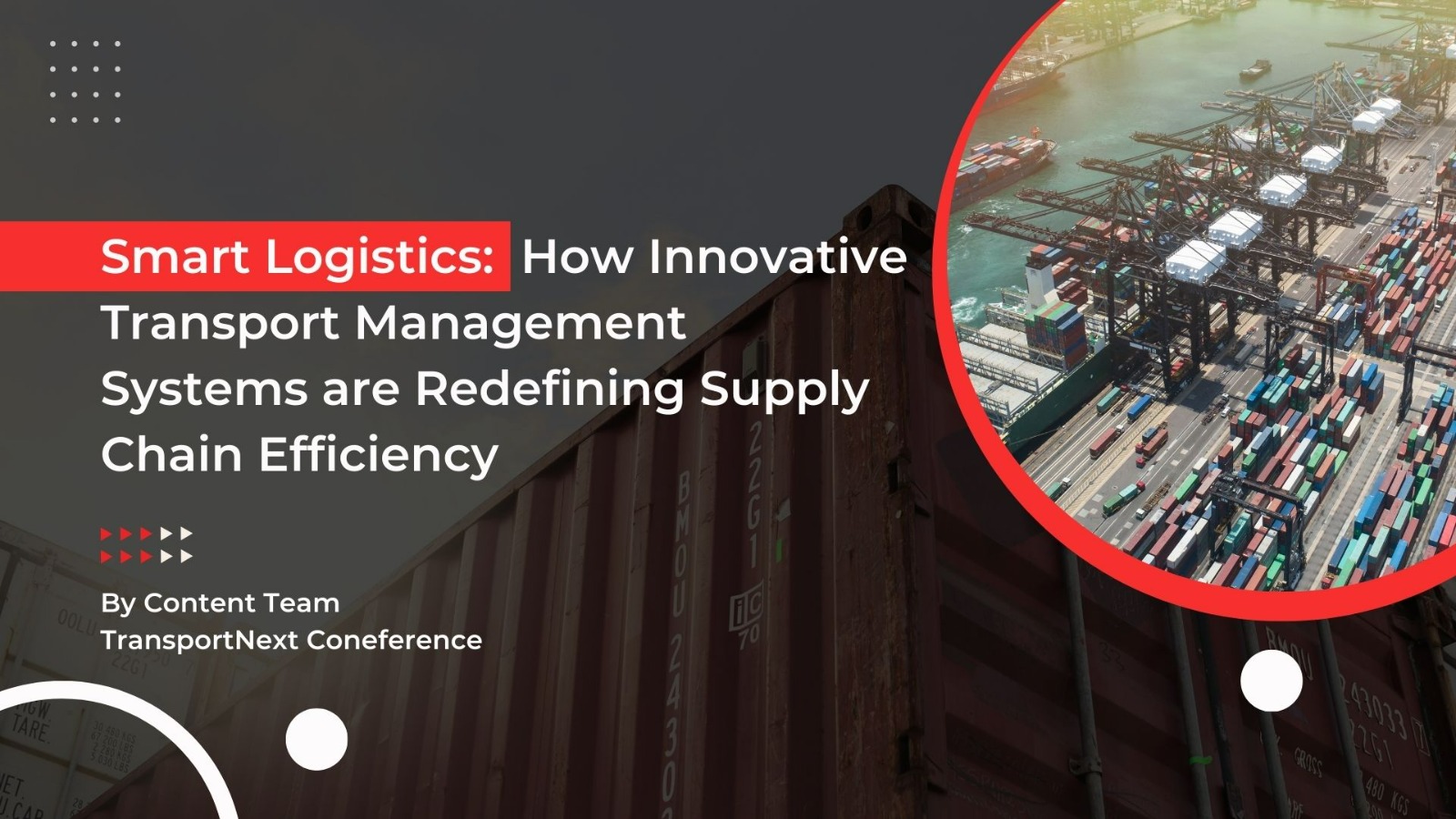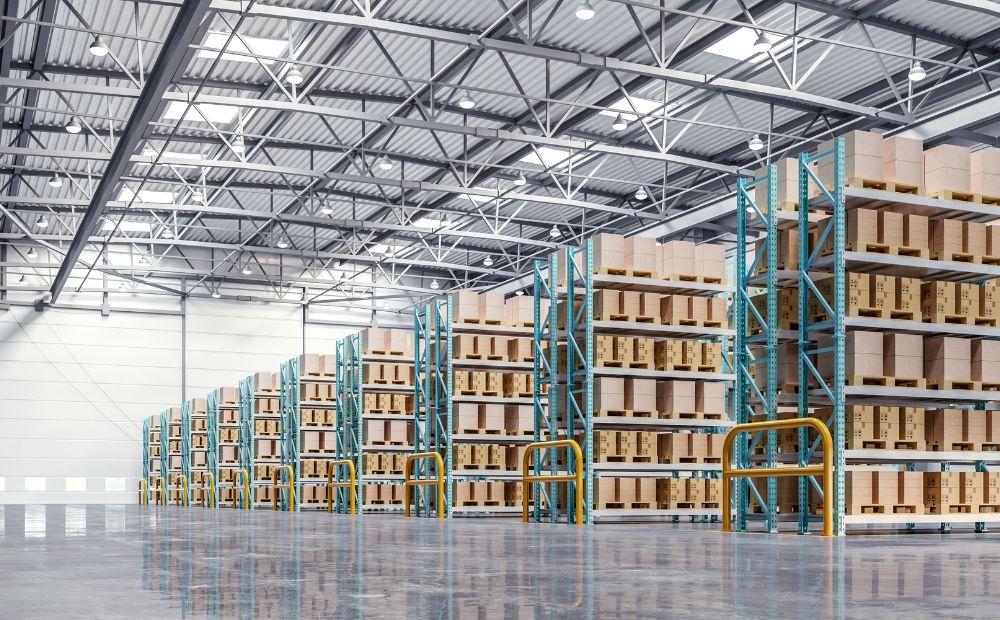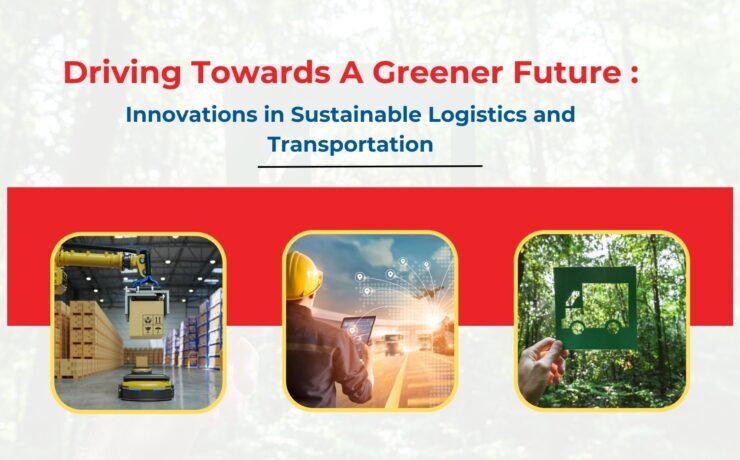Smart Logistics: How Innovative Transportation Management System are Redefining Supply Chain Efficiency

A Transportation Management System (TMS) is a software solution designed to manage and optimize the logistics and transportation activities of an organization. It helps streamline the process of moving goods from one location to another, whether by land, air, or sea. A Transportation Management System (TMS) is a component of supply chain management focused on transportation operations and can be part of an Enterprise Resource Planning (ERP) system. Within the operational framework, the Transportation Management System (TMS) functions as a mediator between Enterprise Resource Planning (ERP) or legacy order processing systems and modules related to warehouse and distribution.
The TMS Planning Module evaluates both incoming (procurement) and outgoing (shipping) orders to suggest routing solutions for users to consider. Users then choose the most appropriate option, which is subsequently passed on to the transportation provider analysis module. This module determines the optimal transportation mode and the most cost-efficient solution. Upon reaching a decision on the best course of action, the electronic load tendering and track-and-trace system manages the shipment process through the selected carrier. Furthermore, the TMS streamlines freight audit and payment procedures. It aligns with ERP systems once orders are transformed into shipments and frequently interfaces with Warehouse Management System (WMS) software, which is commonly interconnected to ERP setups. Here’s an overview of its key components and functionalities:
Table of Contents

Transportation Management System
A Transportation Management System (TMS) is a software solution designed to streamline logistics and transportation operations. It optimizes route planning, load management, carrier selection, and shipment tracking. By integrating with ERP and WMS systems, TMS enhances supply chain efficiency, reduces costs, and improves overall operational performance for businesses.
A Transportation Management System (TMS) is defined as “a platform designed to streamline the shipping process. It is a subset of supply chain management concerning transportation operations and can be part of an enterprise resource planning system.” As Gartner states, “A TMS provides visibility into day-to-day transportation operations, trade compliance information, and documentation, and ensures the timely delivery of freight and goods.”
Key Components and their Functionalities:
1. Planning and Optimization:
Routing Solutions: The TMS evaluates both inbound (procurement) and outbound (shipping) orders to suggest the most efficient routing options. This involves considering factors like delivery windows, distances, traffic conditions, and delivery priorities to propose optimal routes.
Mode Selection: The system determines the best mode of transportation (e.g., road, rail, air, sea) for each shipment. This decision is based on factors like cost, speed, distance, and the nature of the goods being transported.
2. Carrier Management:
Carrier Selection: The TMS identifies and selects the most suitable carriers for each shipment based on criteria such as cost, reliability, service level agreements, and previous performance. This ensures that the best carrier is chosen for each specific need.
Contract Management: The system manages contracts and agreements with various carriers, ensuring that all terms, conditions, and rates are adhered to and that the company leverages the best possible deals.
3. Execution:
Load Tendering: Once the optimal carrier is selected, the TMS electronically tenders the load to the carrier. This process involves sending shipment details and requirements to the carrier, who then confirms acceptance.
Track and Trace: This functionality provides real-time tracking of shipments, allowing users to monitor the progress of their goods through the supply chain. It provides visibility into the location and status of shipments at any given time, which helps in proactive issue resolution.
4. Freight Audit and Payment:
Cost Management: The TMS ensures accurate billing by auditing freight bills against the agreed rates and services. This process helps in identifying and correcting any discrepancies before payments are made.
Dispute Resolution: The system helps manage and resolve billing disputes with carriers, ensuring that all charges are justified and correct, thereby preventing overpayments.
5. Integration:
ERP Integration: A TMS integrates seamlessly with Enterprise Resource Planning (ERP) systems to manage order processing and transform orders into shipments. This integration ensures data consistency and streamlines workflow across different business functions.
WMS Integration: The system also integrates with Warehouse Management Systems (WMS), allowing for efficient coordination between transportation and warehouse operations. This integration helps in managing inventory, order picking, and shipping processes more effectively.
6. Reporting and Analytics:
Performance Metrics: The TMS tracks key performance indicators (KPIs) such as on-time delivery rates, carrier performance, transportation costs, and route efficiency. These metrics help in assessing and improving the transportation operations.
Cost Analysis: The system analyzes transportation costs and provides detailed reports that highlight areas for potential savings. This analysis helps in making informed decisions to reduce overall transportation expenses.
7. Compliance Management:
Regulatory Adherence: The TMS ensures that all transportation activities comply with local, national, and international regulations. This includes adhering to safety standards, environmental regulations, and customs requirements.
Documentation Management: The system manages all necessary shipping documents and regulatory paperwork, ensuring that all documentation is accurate, up-to-date, and readily accessible.
8. Customer Communication:
Notification Systems: The TMS provides updates and notifications to customers about the status of their shipments. This includes alerts for shipment dispatch, transit updates, and delivery confirmations.
Customer Service: The system facilitates communication with customers regarding their shipments, addressing any inquiries or issues they may have. This helps in maintaining high levels of customer satisfaction and trust.
Through the integration of these components, transportation operations are optimized to enhance efficiency, reduce costs, and improve overall supply chain management. Utilizing a TMS enables companies to attain heightened visibility, control, and optimization of their transportation processes.
In relation to logistics, a wide range of industries utilize Transportation Management Systems (TMS) to streamline and optimize their transportation operations. Retail and e-commerce companies like Walmart and Amazon use TMS to handle large volumes of shipments, ensuring efficient delivery routes and timely arrivals. In the manufacturing sector, firms such as General Electric and Procter & Gamble rely on TMS to coordinate inbound and outbound logistics, reducing transportation costs and improving supply chain efficiency. The food and beverage industry, including giants like Coca-Cola and PepsiCo, leverages TMS to maintain product freshness and ensure prompt delivery to retailers.
Pharmaceutical companies like Pfizer use TMS to comply with stringent regulatory requirements and manage the logistics of temperature-sensitive products. Automotive manufacturers such as Tesla optimize the transportation of parts and finished vehicles, enhancing operational efficiency. Additionally, TMS is critical for third-party logistics providers like DHL, which use it to improve shipment visibility and service levels. Across these diverse sectors, TMS enhances logistics by improving route planning, reducing costs, ensuring compliance, and increasing overall delivery reliability.
Innovations in Transportation Management System And Its Impact on the Supply Chain Operations:
Transportation Management Systems (TMS) have undergone significant advancements in recent years, propelled by technological progress and the increasing need for streamlined logistics solutions. Several noteworthy innovations in TMS which enhance the supply chain operations include:
1. Cloud-Based Solutions:
Utilizing a Cloud Transportation Management System (TMS) enables businesses to streamline their transportation and logistics operations efficiently through a software-as-a-service (SaaS) solution. In contrast to traditional TMS software that necessitates local server installation, the cloud-based TMS functions entirely online and is accessible from any device with an internet connection. Equipped with features like route planning, load optimization, carrier management, shipment tracking, and analytics, the cloud TMS incorporates advanced technologies such as real-time data integration, predictive analytics, and machine learning to enhance transportation efficiency and reduce expenses.
The primary advantages of this system include scalability, allowing businesses to adjust resources without significant infrastructure investments, and accessibility, enabling remote management and real-time collaboration. Its subscription-based pricing model offers a cost-effective solution suitable for businesses of all sizes aiming to improve their transportation management processes. Flexport, a global freight forwarding and logistics company, utilizes a cloud-based TMS to offer its clients real-time visibility into their shipments, streamline communication, and optimize transportation routes.
2. Predictive Analytics:
TMS now leverage predictive analytics and machine learning algorithms to forecast demand, optimize routes, and anticipate potential disruptions. By analyzing historical data and external factors like weather and traffic patterns, predictive analytics help companies make proactive decisions to improve efficiency and reduce costs. Uber Freight uses predictive analytics in its TMS to forecast demand and optimize pricing for freight shipments. By analyzing historical data and market trends, Uber Freight can offer more competitive rates and improve efficiency.
3. Real-Time Tracking and Visibility:
Innovations in tracking technologies, such as IoT sensors and GPS tracking devices, provide real-time visibility into shipments and vehicles. This enables companies to monitor the status and location of their assets, optimize routes on the fly, and respond quickly to changing conditions. FedEx incorporates real-time tracking and visibility features into its TMS, allowing customers to monitor the status and location of their shipments in real time. This transparency enhances customer satisfaction and trust in FedEx’s services.
4. Integration with IoT and Telematics:
TMS now integrate with Internet of Things (IoT) devices and telematics systems to collect data on vehicle performance, driver behavior, and environmental conditions. By leveraging this data, companies can improve safety, optimize fuel efficiency, and enhance overall fleet management. Maersk, one of the world’s largest shipping companies, integrates IoT and telematics technology into its TMS to track containerized cargo in real time. By leveraging sensor data, Maersk can optimize vessel schedules, reduce transit times, and improve overall supply chain efficiency.
5. Blockchain for Supply Chain Transparency:
Some TMS solutions incorporate blockchain technology to provide greater transparency and traceability across the supply chain. By recording transactions in a secure and immutable ledger, block IBM Food Trust utilizes blockchain technology in its TMS to provide end-to-end traceability and transparency in the food supply chain. By recording transactions on a secure and immutable ledger chain enhances trust, reduces the risk of fraud, and improves compliance with regulations. IBM Food Trust helps companies like Walmart and Nestlé ensure food safety and compliance with regulations.
6. Mobile Applications:
Mobile apps have become an integral part of TMS, allowing users to manage transportation operations on the go. These apps provide access to critical functionalities such as shipment tracking, communication with drivers, and document management, enhancing flexibility and responsiveness. Convoy, a digital freight network, offers a mobile app as part of its TMS platform. The app allows drivers to receive and accept shipments, submit delivery updates, and communicate with shippers and carriers in real time, improving efficiency and coordination in freight transportation.
7. AI-Powered Automation:
Artificial intelligence (AI) and machine learning are increasingly being used to automate routine tasks and optimize decision-making in TMS. AI-powered algorithms can analyze vast amounts of data to identify patterns, predict outcomes, and suggest the most cost-effective transportation options. C.H. Robinson, a global logistics company, employs AI-powered algorithms in its TMS to automate load matching and optimize carrier selection. By analyzing historical data and market conditions, C.H. Robinson can match shippers with the most suitable carriers, reducing costs and improving service levels.
8. Integration with ERP and WMS:
Seamless integration with Enterprise Resource Planning (ERP) and Warehouse Management Systems (WMS) has become standard in modern TMS solutions. This integration allows for better coordination between different aspects of the supply chain and ensures data consistency across the organization. Manhattan Associates offers a TMS solution that integrates seamlessly with ERP and WMS systems. This integration allows companies like Home Depot and Nike to synchronize transportation planning with inventory management and order processing, ensuring efficient and coordinated supply chain operations.
Transparency and providing comprehensive information are crucial when guiding buyers through the TMS offered in logistics industry. It’s important to acknowledge that there’s no one-size-fits-all solution in the TMS industry, as each platform has its unique features and strengths. By being transparent about the various TMS options available, buyers can make informed decisions based on their specific needs and requirements. This approach ensures that they can find the best fit for their supply chain technology upgrade.
Here’s a list of some of the top TMS available:
- 3Gtms
- E2open
- Descartes
- Blue Yonder
- Manhattan
- MercuryGate
- Oracle
- SAP
- TMC – A Division of C.H. Robinson
- Trimble
- Uber Freight TMS (formerly Transplace)
Transportation Management Systems (TMS) are essential components of modern logistics and supply chain management, playing a crucial role in efficiently managing and optimizing transportation operations through centralized, web-based platforms. These systems provide various benefits, such as improved route planning, load optimization, carrier management, shipment tracking, and analytics, leveraging advanced technologies like real-time data integration, predictive analytics, and machine learning. TMS contribute to enhancing transportation efficiency, reducing costs, and elevating overall supply chain performance, making them indispensable tools for businesses aiming to stay competitive in today’s rapidly evolving market.
Moreover, their scalability and accessibility make them invaluable for businesses of all scales, delivering cost-effective solutions and facilitating seamless collaboration throughout the supply chain. Overall, TMS serve as indispensable assets for businesses looking to streamline operations, enhance customer satisfaction, and drive sustainable growth in the ever-evolving logistics industry. As global trade continues to evolve, the supply chain industry will need to adapt and innovate to meet the demands of a dynamic market.
Logistic Events are vital for gaining insights into industry practices and innovations, facilitating meaningful connections, and opening doors for shared resources. An annual premier worldwide event, the TransportNext Awards, Conference, and Expo is organized by Next Business Media in Singapore and the United States. The transport and logistics community throughout the rest of the world is served by the Singapore edition. By taking advantage of Singapore’s advantageous position, it offers a forum for global cooperation and knowledge sharing. TransportNext Singapore provides enlightening talks, engaging workshops, and a large expo. It also highlights innovative solutions and promotes strategic alliances.
The TransportNext Awards, which honor achievements in the sector, are the focal point. This Logistics event guarantees an unmatched networking and growth-promoting experience because of its global reach and dedication to Logistics and Transportation industry improvement.





